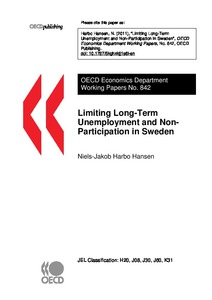Limiting long-term unemployment and non-participation in Sweden
"After the onset of the crisis, unemployment in Sweden increased markedly, though much less than expected and than during the early 1990s, even as participation in the labour market held up well. The challenge going forward is to ensure that high unemployment does not become entrenched or leads...
| Main Authors: | , |
|---|---|
| Institution: | ETUI-European Trade Union Institute |
| Format: | TEXT |
| Language: | English |
| Published: |
Paris
2011
OECD |
| Subjects: | |
| Online Access: | https://www.labourline.org/KENTIKA-19182409124919006819-Limiting-long-term-unemploymen.htm |
| Summary: | "After the onset of the crisis, unemployment in Sweden increased markedly, though much less than expected and than during the early 1990s, even as participation in the labour market held up well. The challenge going forward is to ensure that high unemployment does not become entrenched or leads to withdrawals from the labour force. The government has taken measures to mitigate this risk, particularly in the areas of job-search incentives and enrolment in education. Nevertheless, additional reforms are needed to ensure a sustained job-rich expansion. Such reforms should focus on increasing the flexibility of the labour market and strengthening job-search incentives further. This Working Paper relates to the 2011 OECD Economic Survey of Sweden (www.oecd.org/eco/surveys/Sweden)." |
|---|---|
| Physical Description: | 40 p. Digital |

